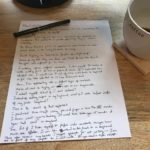I recently started writing my next book.
I’m not ready to share the details just yet, but I am ready to share with you a strategy that I use to bring out my best work.
It’s called procrastination.
By that, I don’t mean the type of procrastination where you decide to clean your sock drawer instead of drafting that presentation you’ve been avoiding.
Rather, it’s a strategic type of procrastination that you can use to generate original insights regardless of what you’re working on.
Here’s how it works for me. I start each chapter of the book as quickly as possible. I jot down ideas, arguments, counter-arguments, examples—anything that’s already on my mind that might be relevant.
These first thoughts aren’t my best thoughts. William Deresiewicz had it right: “My first thought is always someone else’s; it’s always what I’ve already heard about the subject, always the conventional wisdom.”
After I jot down ideas to plant some seeds in my brain, I walk away and wait to see what blossoms.
While looks can be deceiving, this waiting isn’t passive.
When we start a project and deliberately stop, we ignite the thought factory in our brain. Even as we wait, our subconscious remains hard at work—consolidating memories, making associations, and marrying the new with the old to create new combinations. As this alchemical process occurs, I consciously mine my thoughts for new golden insights on each chapter and write them down as soon as they come up.
This is why phrases like epiphany, flash of light, or stroke of genius are often used to describe the eureka moment—Greek for “I’ve found it.” Ideas seem to explode into life during slack times, not during hard labor.
Something else happens when I start a project and deliberately step away. I turn into a magnetized rod that attracts ideas. I begin to notice relevant insights in everything I read, watch, and observe. Seemingly random events and stories transform into ideas that I can use.
Take this article, for example. I came up with it a few weeks ago, wrote down some thoughts, and then put it away. Last week on a beach in Cabo, I was reading the 900-page tome that is Team of Rivals: The Political Genius of Abraham Lincoln by Doris Kearns Goodwin (yes, I have an unusual definition of “beach reading”). In the book, I came across a passage about Lincoln’s writing process. Lincoln would often jot down his initial thoughts, step away from what he wrote, and after waiting for days or weeks, return to it to polish and elaborate.
In other words, Lincoln would use the same strategy that I’m describing here. But if I hadn’t started this article before I began reading the book, the relevance of this 150-year-old story would have been lost on me.
This is an intentional, not impulsive, type of procrastination. It’s a way of walking away from the project to grow the project—not to avoid it. Which means, like Lincoln, you’ll need to return to your desk to finish it.
It may not feel like it, but we’re all walking repositories of epiphanies hidden in our subconscious.
But, as the saying goes, a watched pot never boils.
You often have to walk away from the problem for the best answers to arrive.
Bold



